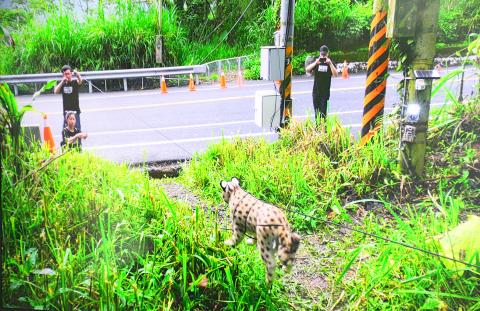A roadside detection system to help protect endangered leopard cats from being hit by passing vehicles was unveiled on Friday in northern Taiwan.
The system, the first of its kind, was developed by the Endemic Species Research Institute and National Chung Hsing University in a project initiated by the Directorate-General of Highways.
It uses thermal imaging cameras and artificial intelligence-powered recognition software to identify leopard cats and display a warning message on a traffic sign 1km ahead of where the animal is detected.

Photo: CNA
The system warns drivers and gives them time to take precautions, said Chiang Ya-yu (蔣雅郁), an assistant professor at the university’s Department of Mechanical Engineering.
It emits pulsing lights and sound to discourage the animal from crossing the road, Chiang said.
The system, installed on the Jhuolan section of Provincial Highway No. 3, can also detect Chinese ferret-badgers and Formosan gem-faced civets, Chiang added.
Sixteen cameras have been set up along the stretch of road to collect data, the highway authority said, adding that depending on the results, it might expand the system to other places.
There are less than 500 leopard cats in the wild nationwide, and most can be found in Taichung, and Miaoli and Nantou counties, the Leopard Cat Association of Taiwan said.
Four leopard cats have been reported killed by traffic so far this year.

Taiwanese can file complaints with the Tourism Administration to report travel agencies if their activities caused termination of a person’s citizenship, Mainland Affairs Council Minister Chiu Chui-cheng (邱垂正) said yesterday, after a podcaster highlighted a case in which a person’s citizenship was canceled for receiving a single-use Chinese passport to enter Russia. The council is aware of incidents in which people who signed up through Chinese travel agencies for tours of Russia were told they could obtain Russian visas and fast-track border clearance, Chiu told reporters on the sidelines of an event in Taipei. However, the travel agencies actually applied

Japanese footwear brand Onitsuka Tiger today issued a public apology and said it has suspended an employee amid allegations that the staff member discriminated against a Vietnamese customer at its Taipei 101 store. Posting on the social media platform Threads yesterday, a user said that an employee at the store said that “those shoes are very expensive” when her friend, who is a migrant worker from Vietnam, asked for assistance. The employee then ignored her until she asked again, to which she replied: "We don't have a size 37." The post had amassed nearly 26,000 likes and 916 comments as of this

New measures aimed at making Taiwan more attractive to foreign professionals came into effect this month, the National Development Council said yesterday. Among the changes, international students at Taiwanese universities would be able to work in Taiwan without a work permit in the two years after they graduate, explainer materials provided by the council said. In addition, foreign nationals who graduated from one of the world’s top 200 universities within the past five years can also apply for a two-year open work permit. Previously, those graduates would have needed to apply for a work permit using point-based criteria or have a Taiwanese company

The Shilin District Prosecutors’ Office yesterday indicted two Taiwanese and issued a wanted notice for Pete Liu (劉作虎), founder of Shenzhen-based smartphone manufacturer OnePlus Technology Co (萬普拉斯科技), for allegedly contravening the Act Governing Relations Between the People of the Taiwan Area and the Mainland Area (臺灣地區與大陸地區人民關係條例) by poaching 70 engineers in Taiwan. Liu allegedly traveled to Taiwan at the end of 2014 and met with a Taiwanese man surnamed Lin (林) to discuss establishing a mobile software research and development (R&D) team in Taiwan, prosecutors said. Without approval from the government, Lin, following Liu’s instructions, recruited more than 70 software